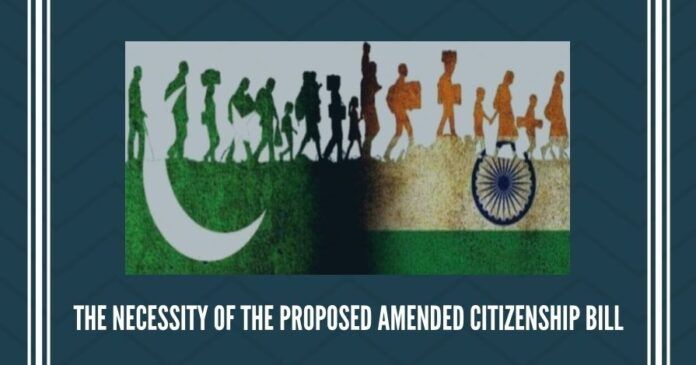
Ways must be found to give refuge to millions of fleeing Hindus & Sikhs from Afghanistan, Pakistan, Bangladesh with full citizenship status—for they have only India to turn to.
The Citizenship (Amendment) Bill, 2016, which seeks to provide Indian citizenship to Hindus, Sikhs, Buddhists, Jains, Parsis, and Christians, fleeing persecution from Afghanistan, Pakistan, and Bangladesh, has been evoking much of protests in Assam for more than a year now.
After the partition, India chose to remain a secular nation, giving equal rights to all, Pakistan chose to become an Islamic nation where Hindus do not have the same right as Muslims.
But on every human consideration, they should be welcome in India. Most of them, Hindus and Sikhs, in particular, are originally Indian (citizens of undivided India) and they are being persecuted in their present residence-countries for not any of their faults. Most of them still have many friends and relatives in India.
The late 1940s, just prior to and immediately after Independence, saw lakhs of Bengali Hindu refugees settling in Assam and West Bengal. Hindus once again migrated from (then) East Pakistan in large numbers fleeing persecution from the Pakistani army in 1970-71. The number of Hindus living in Bangladesh continues to shrink. Experts blame it on continued religious persecution and systematic oppression against the minority community.
In this connection, we may not forget the tragic past of partition of Bengal, the stupendous sacrifice and the inhuman sufferings associated. So, demand for settlement in India of the Hindu population of Bangladesh is only legitimate particularly, when they are of the same language and religion as that of Bengal and they were all original residents of undivided India.
When India was partitioned, two nations were formed. India and Pakistan. While India chose to remain a secular nation, giving equal rights to all, Pakistan chose to become an Islamic nation where Hindus do not have the same right as Muslims. India has, therefore, an obligation to accommodate those discriminated Hindus. In this connection, the Congress Working Committee had adopted the following resolution on 25th November 1947: “The Congress is bound to afford full protection to all those non-Muslims from Pakistan who have crossed the border and come over to India or may do so to save their life and honor.”
The proposed amendment bill seeks to reduce the period from 11 to 6 years for Hindus, Sikhs, Buddhists, Jains, Parsis, and Christians from Bangladesh, Afghanistan, and Pakistan, even if they have entered illegally.
The National Register of Citizens (NRC) in Assam is a register containing details of all Indian citizens in Assam. The first NRC was prepared in 1951, by recording details of people included in that year’s Census. Now, it is being updated only in Assam, to comply with the demands in the Assam Accord, which was the culmination of the six-year-long Assam Movement against migrants from Bangladesh. Assam undertook the exercise in September 2015 and published the two drafts on December 31,2017 and July 30, 2018. Even after that, more than 40 lakh people were found to be invalid citizens of India.
Now, March 24, 1971, is the cut-off date as per the Assam Accord of 1985 for detection and deportation of foreign nationals — regardless of their religion — from Assam. The proposed bill will advance this cut-off date for detecting foreigners to December 31, 2014. Also, the Citizenship Act, 1955, already has provisions for citizenship by naturalization, provided the applicant has entered legally, and resided in India for 11 of the past 14 years — the proposed amendment bill seeks to reduce the period from 11 to 6 years for Hindus, Sikhs, Buddhists, Jains, Parsis, and Christians from Bangladesh, Afghanistan, and Pakistan, even if they have entered illegally.
The dispute is mainly on the above two points and especially on the cut-off date. This should not be irreconcilable and the parties to the dispute may sincerely discuss and agree on a mutually acceptable cut-off date and citizenship period.
It is for every Indian including the Assamese to appreciate that ways must be found to give refuge to millions of fleeing Hindus and Sikhs from Afghanistan, Pakistan and Bangladesh with full citizenship status—for Hindus and Sikhs have only India to turn to while the others have dozens of own places to seek refuge in and around the world.
Note:
1. The views expressed here are those of the author and do not necessarily represent or reflect the views of PGurus.
- The real Parivartan is to be ushered in now. - March 23, 2021
- When will the truth dawn on Bengalis? - March 13, 2021
- The many arguments of anti-Modi intellectuals - November 5, 2020











https://www.bangodesh.com/2018/12/hindu-refugee-plight-continues/
Hindu refugee plight continues amid Indian democracy’s solemn, humane pledges
https://www.barakbulletin.com/en_US/congress-must-fulfil-its-promises-made-to-the-hindu-refugees-an-open-letter-from-bishu-duttachoudhury/?fbclid=IwAR1JF7M5z1Lug-j3Cob1M8cnKcgj3U175yjI719GP7yZmqgxQMBR5kXu1rM CONGRESS MUST FULFIL THE PROMISES GIVEN TO THE HINDU REFUGEES
Govt could have spread those immigrants through out India without burdening one state
We need to understand the Assamese concern. Refugees need to be resettled throughout India .